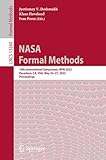NASA Formal Methods [electronic resource] : 14th International Symposium, NFM 2022, Pasadena, CA, USA, May 24-27, 2022, Proceedings / edited by Jyotirmoy V. Deshmukh, Klaus Havelund, Ivan Perez.
Contributor(s): Deshmukh, Jyotirmoy V [editor.] | Havelund, Klaus [editor.]
| Havelund, Klaus [editor.] | Perez, Ivan [editor.]
| Perez, Ivan [editor.] | SpringerLink (Online service)
| SpringerLink (Online service) .
.
Material type:  BookSeries: Lecture Notes in Computer Science: 13260Publisher: Cham : Springer International Publishing : Imprint: Springer, 2022Edition: 1st ed. 2022.Description: XXII, 828 p. 219 illus., 168 illus. in color. online resource.Content type: text Media type: computer Carrier type: online resourceISBN: 9783031067730.Subject(s): Software engineering
BookSeries: Lecture Notes in Computer Science: 13260Publisher: Cham : Springer International Publishing : Imprint: Springer, 2022Edition: 1st ed. 2022.Description: XXII, 828 p. 219 illus., 168 illus. in color. online resource.Content type: text Media type: computer Carrier type: online resourceISBN: 9783031067730.Subject(s): Software engineeringInvited Keynotes -- Formal Methods for Trusted Space Autonomy: Boon or Bane -- An Essence of Domain Engineering - A Basis for Trustworthy Aeronautics and Space Software -- Concept Design Moves -- Automating Program Transformation with Coccinelle -- The Prusti Project: Formal Verification for Rust -- Summers Reachability Analysis for Cyber-Physical Systems: Are we there yet -- Regular Submissions -- Towards Better Test Coverage: Merging Unit Tests for Autonomous Systems -- Quantification of Battery Depletion Risk Made Efficient -- Hierarchical Contract-based Synthesis for Assurance Cases -- Verified Probabilistic Policies for Deep Reinforcement Learning -- NNLander-VeriF: A Neural Network Formal Verification Framework for Vision-Based Autonomous Aircraft Landing -- The Black-Box Simplex Architecture for Runtime Assurance of Autonomous CPS -- Case Studies for Computing Density of Reachable States for Safe Autonomous Motion Planning -- Towards Refactoring FRETish Requirements -- Neural Network Compression of ACAS Xu Early Prototype is Unsafe: Closed-Loop Verification through Quantized State Backreachability -- ZoPE: A Fast Optimizer for ReLU Networks with Low-Dimensional Inputs -- Permutation Invariance of Deep Neural Networks with ReLUs -- Configurable Benchmarks for C Model Checkers -- AssumeGuarantee Reasoning with Scheduled Components -- Stateful Black-Box Fuzzing of Bluetooth Devices Using Automata Learning -- From Verified Scala to STIX File System Embedded Code using Stainless -- On the Termination of Borrow Checking in Featherweight Rust -- Programming Than Programming: Teaching Formal Methods in a Software Engineering Programme -- Zone Extrapolations in Parametric Timed Automata -- Exemplifying Parametric Timed Specifications over Signals with Bounded Behavior -- Timed Automata Learning via SMT Solving -- Asynchronous Composition of Local Interface LTL Properties -- Elucidation and Analysis of Specification Patterns in Aerospace System Telemetry -- Robust Computation TreeLogic -- On the-Fly Model Checking with Neural MCTS -- Checking and Test Generation for Comprehensive Verification -- Operational Annotations: a New Method for Sequential Program Verification -- Byzantine Fault Tolerant Consensus in Agda -- DSV: Disassembly Soundness Validation without Assuming a Ground Truth -- Probabilistic Hyperproperties with Rewards -- Hypercontracts -- Monitorability of Expressive Verdicts -- BDDs Strike Back: Efficient Analysis of Static and Dynamic Fault Trees -- Approximate Translation from Floating-Point to Real-Interval Arithmetic -- Synthesis of Optimal Defenses for System Architecture Design Model in MaxSMT -- Certified Computation of Nondeterministic Limits -- The Power of Disjoint Support Decompositions in Decision Diagrams -- Incremental Transitive Closure for Zonal Abstract Domain -- Proof Mate: an Interactive Proof Helper for PVS -- Runtime Verification Triggers -- Real-time, Autonomous Fault Recovery on the CySat-I.
This book constitutes the proceedings of the 14th International Symposium on NASA Formal Methods, NFM 2022, held in Pasadena, USA, during May 24-27, 2022. The 33 full and 6 short papers presented in this volume were carefully reviewed and selected from 118submissions. The volume also contains 6 invited papers. The papers deal with advances in formal methods, formal methods techniques, and formal methods in practice. The focus on topics such as interactive and automated theorem proving; SMT and SAT solving; model checking; use of machine learning and probabilistic reasoning in formal methods; formal methods and graphical modeling languages such as SysML or UML; usability of formal method tools and application in industry, etc. .


There are no comments for this item.